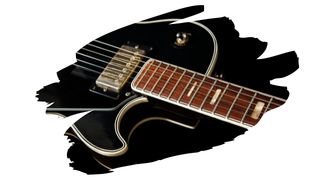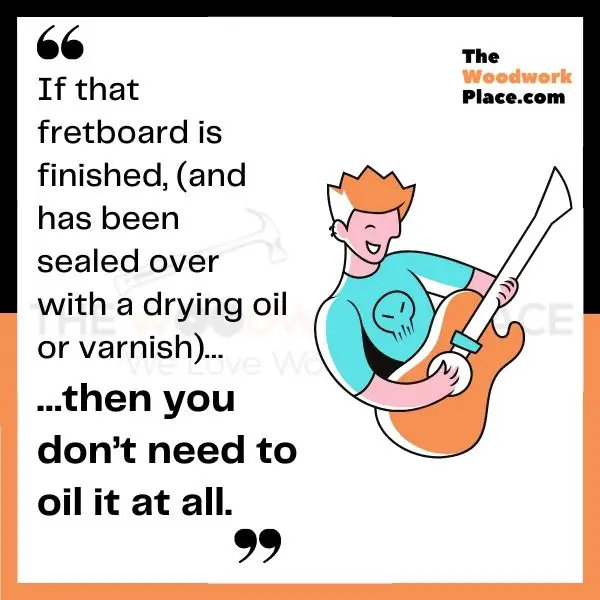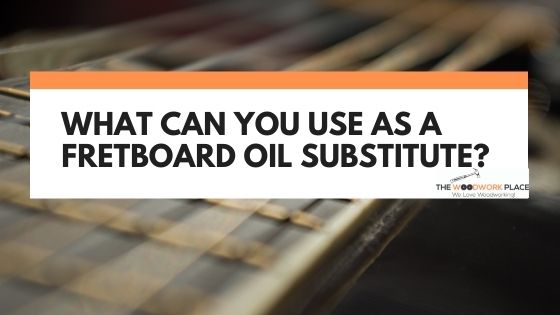Every guitar fretboard needs regular maintenance.
So, through regular conditioning, we can prevent unfinished fretboards from drying out. And the best way to keep wood hydrated is to soak it with non-drying oils.
But, in the case of an ebony fretboard, conditioning isn’t really necessary… is it?
Well, ebony fretboards are made from ebony hardwood, which is an incredibly compact dark brown timber. This timber type is so dense that ebony wood logs sink (rather than float) in water.
But its density is just one reason why ebony is so durable. Another reason lies in its natural high oil content.
Ebony wood doesn’t need an oil finish to make it pretty water-resistant. That is because ebony wood is already packed to the gills with water-repelling oils.
In fact, the oils in ebony wood also make it difficult for some sealers and wood glues to stick and stay onto it.
So, if it already comes with it’s own oil finish, what is the best oil for an ebony fretboard?
Well, because ebony is so oily, ebony fretboards are usually left unfinished. So, these particular fretboards don’t need a sealing oil finish.
However, ebony fretboards can dry out, and so they will need regular conditioning. In which case, 100% food grade mineral oil should be used to rehydrate this hardwood.
But, if mineral oil is the best thing for ebony wood, why are there so many ‘lemon oil’ fretboard products?
Related Post: Deciding Between Lemon Oil Vs Tung Oil For Your Fretboard
Plus, oiling that ebony fretboard is one thing, but you need to be careful that you don’t oil them too frequently.
So, in this post, you’ll learn why mineral oil is the only fretboard oil you should be using on ebony wood. You’ll also learn why using drying oils like Linseed and Tung oil are complete no-no’s for an ebony fretboard.
Plus, we will cover whether or not conditioning your fretboard is enough to clean and freshen it up too…

This post may contain affiliate links to products that we receive a commission for (at no additional cost to you). Learn more here.
Do You Oil An Ebony Fretboard?
If that ebony fretboard is unfinished, (like most of them are), then you will need to oil it regularly to keep it from drying out.
But, if that fretboard is finished, (and has been sealed over with a drying oil or varnish), then you don’t need to oil it at all.
The aim of a penetrating oil is to sink into wood. However, a finished wooden surface will have been coated with a film that prevents anything from soaking into the wood underneath.
Related Post: Can You Use Orange Oil To Condition A Dry Guitar Fretboard? (Revealed!)
How Do You Treat And Rehydrate An Ebony Fretboard?
The only way to hydrate a fretboard is by rubbing an oil treatment into it. However, and this is important, you need to use a non-drying penetrating oil.
Non-drying oils are oils that don’t dry and cure into a hard resin film, (such as Mineral oil).
Drying oils, on the other hand, are oil finishes that will cure and harden to leave behind a thin coat on the surface, (such as Linseed oil and Tung oil).
If you want to condition a wooden fretboard, apply non-drying oils to it only.

Should You Even Condition An Ebony Fretboard?
Yes, you should. Although ebony wood is oily, (just like Rosewood), it can still become parched in very dry environments.
Related Post: What Can You Use As A Rosewood Fretboard Finish? (Revealed!)
A regular conditioning treatment once every 12 months is enough to prevent ebony timber from dehydrating.
But, you should always keep an eye on the overall condition of those frets. If you see any fine cracks begin to appear on the woods surface, then apply that mineral oil sooner rather than later.
What Oil Do You Use On Ebony Wood?
Use 100% Food Grade Mineral Oil (side note: stick to food grade mineral oil, as other types of mineral oil are toxic).
Now, mineral oil is sourced from petroleum, so it won’t go off and rot away.
It isn’t acidic (like pure lemon oil), nor does it harden (like Linseed oil). And, if you stick to applying just a few droplets of this stuff, it will rub right into ebony wood and saturate it.
Related Post: What Can You Use As A Fretboard Oil Substitute?
Does Conditioning Ebony Fretboard Also Clean It?
Mineral oil is often used to remove stains, grime, and wipe down wooden surfaces. So, it will clean wood to an extent.
But, conditioning a fretboard is about rehydrating wood, not cleaning it. Which means rubbing this oil into wood isn’t going to remove a lot of dirt from the fretboard.

How Do You Clean An Ebony Fretboard?
The aim of cleaning it is to remove dirt and grime from the surface. If you use oils to clean the fretboard, those oils will simply soak into the wood underneath.
So, if you want to give the fretboard a clean, then wipe the gunk off with a water-dampened lint-free cloth.
Just water alone will be enough to wash that fretboard surface. And, don’t go wiping unfinished ebony with dish-soapy water. That dish soap will be too harsh on that bare wood.
Can You Use Lemon Oil On An Ebony Fretboard?
First off, do not use pure lemon oil at all. This stuff is highly acidic, and will bleach out the fretboard.
Now, fretboard oils might be marketed as lemon oil, but they barely contain any of the stuff. Instead, they are mineral oil products that have a droplet or two of lemon essential oils added to them.
The lemon oil gives the product a nice aroma, while the mineral oil does the real work of soaking into lumber.
So, while you can use a speciality fretboard oil, just know that regular store-bought mineral oil will do the same job (for less money).
Can You Use Linseed Oil On An Ebony Fretboard?
You can use linseed oil to finish an ebony fretboard (if you wanted to seal it once and for good).
However, don’t use linseed oil for conditioning a fretboard. Linseed oil is a drying oil that sinks into wood, but will leave a hard resin coat behind on the outside.
And, if you regularly oil the fretboard with this linseed oil, each conditioning coat will build up over time around the frets.
Related Post: Lemon Oil Vs Linseed Oil: Which One’s Better For Your Fretboard?
Can You Use Coconut Oil On An Ebony Fretboard?
No, don’t use coconut oil. This food-source oil will go rotten and rancid.
And once you have rancid oil soaking into your expensive ebony fretboard, there is little you can do to fix it afterwards.
So, Here Are The 3 Key Takeaways…
- Ebony fretboards are typically left unfinished, since this wood type is naturally oily.
- However, despite its natural oils, ebony wood needs to be conditioned once a year (or more frequently in very dry climates).
- Use 100% food grade mineral oil to rehydrate an ebony fretboard. But, avoid using pure lemon oil as it is too acidic.
References:
https://www.wri.org/insights/building-sustainable-guitar-ebony



